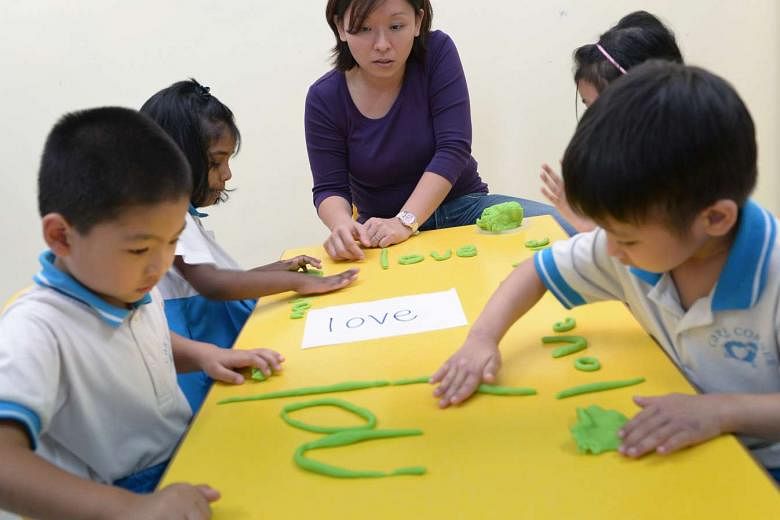SINGAPORE - A three-year-old scheme that has social workers and educational therapists working alongside pre-school teachers to help disadvantaged children and their families, has led to big gains in learning for the 76 pre-schoolers and encouraged more involvement from their parents.
Now to help even more children, the Circle of Care scheme piloted by philanthropic group Lien Foundation and welfare organisation Care Corner at two centres, will be extended to another seven pre-schools and two primary schools this year, so that the children will have a smoother transition from kindergarten to primary school.
Care Corner and Lien Foundation which announced the expansion at a press conference on Wednesday (March 2) morning said they are partnering anchor pre-school operators MY World Preschool, PAP Community Foundation, Singapore Muslim Women's Association as well as Lakeside Primary and Gan Eng Seng Primary School to extend the scheme.
The model was successfully piloted at two of Care Corner's Leng Kee and Admiralty childcare centres in 2013. It uses a new and integrated approach that weaves a "circle of care" around the child, bringing teachers, social workers, education therapists and community partners - who typically work apart - together to provide a holistic continuum of care for children.
Social workers, teachers and therapists working as a team are able to identify the root causes of a child's difficulties, provide help on different fronts and extend assistance to the children and their families.
Of the 76 at-risk children at the two centres, 95 per cent came from families with household incomes of below $3,000 a month and the majority lived in HDB rental flats.
They suffered from irregular school attendance due to problems that ranged from health issues, financial and housing distress, unemployed parents or death in the family.
The Circle of Care team managed to raise their average attendance from about 30 per cent to 70 per cent by working closely with their families. Continued and long-term engagement was crucial in breaking the cycle of skipping school.
The children who were given help with their literacy and numeracy skills made improvements.
The scheme also encouraged parents to become more involved with their children's development.
In one pre-school of 80 children, parent-teacher conferences in 2012 was attended by only a handful of parents. After the Circle of Care scheme was introduced, attendance rates rose to 32 per cent and then 54 per cent last year.
On extending the scheme to primary schools, Lien Foundation and Care Corner officials said there is presently no formal system of information sharing or collaboration between the pre-schools and primary schools.
This means that some of the hard-won progress made by at-risk children under Circle of Care scheme could be affected.
Under the primary school transition programme, the Circle of Care team will prepare the children for Primary 1 and their parents on how they can support their children. Before school starts, workshops and school visits will be organised for the parent and child. The social worker will collaborate with the school's counsellor, class teacher and allied educator and be a key point of assistance between the school and parents in relation to the child's attendance, class performance, and relationship with teachers and peers.
"Children from low-income families are hurt not only by their circumstances, but by the silo-ed manner the present system defines and addresses their inter-connected needs," said Mr Lee Poh Wah, chief executive officer of Lien Foundation.
Mr Yap Poh Kheng, CEO of Care Corner said: "The pre-school is the best place for social work intervention. With COC we are able to holistically integrate learning support services and social work intervention for less advantaged children and families, within a natural childcare setting which offers extended opportunities for engagement."


